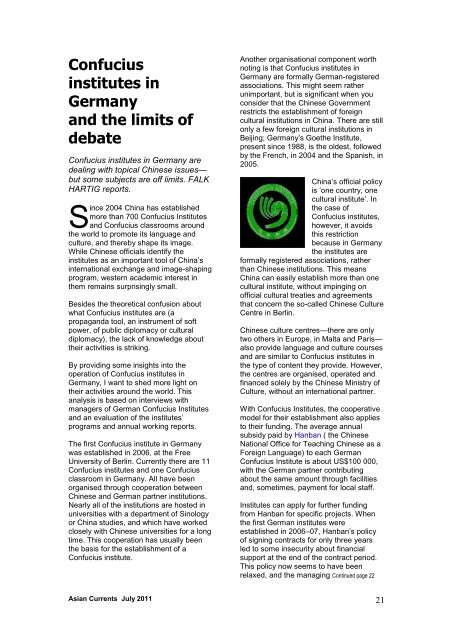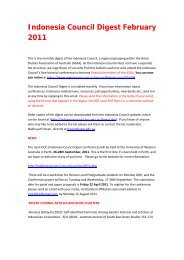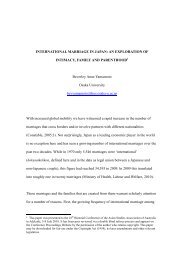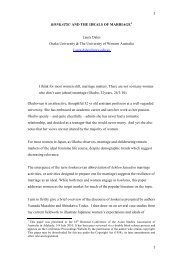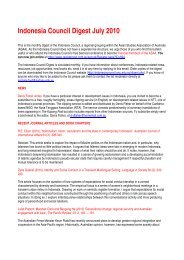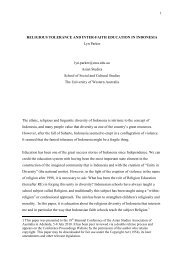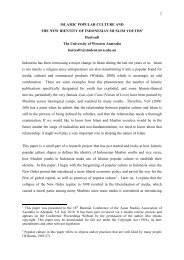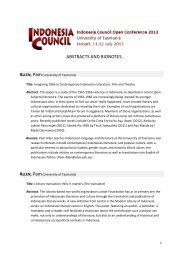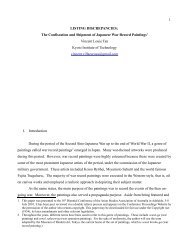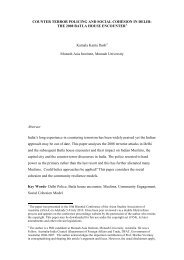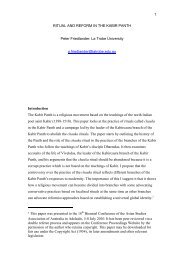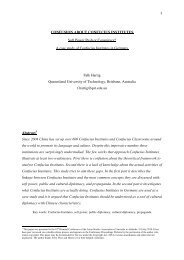Asian Currents - Asian Studies Association of Australia
Asian Currents - Asian Studies Association of Australia
Asian Currents - Asian Studies Association of Australia
Create successful ePaper yourself
Turn your PDF publications into a flip-book with our unique Google optimized e-Paper software.
Confucius<br />
institutes in<br />
Germany<br />
and the limits <strong>of</strong><br />
debate<br />
Confucius institutes in Germany are<br />
dealing with topical Chinese issues—<br />
but some subjects are <strong>of</strong>f limits. FALK<br />
HARTIG reports.<br />
S<br />
ince 2004 China has established<br />
more than 700 Confucius Institutes<br />
and Confucius classrooms around<br />
the world to promote its language and<br />
culture, and thereby shape its image.<br />
While Chinese <strong>of</strong>ficials identify the<br />
institutes as an important tool <strong>of</strong> China‘s<br />
international exchange and image-shaping<br />
program, western academic interest in<br />
them remains surprisingly small.<br />
Besides the theoretical confusion about<br />
what Confucius institutes are (a<br />
propaganda tool, an instrument <strong>of</strong> s<strong>of</strong>t<br />
power, <strong>of</strong> public diplomacy or cultural<br />
diplomacy), the lack <strong>of</strong> knowledge about<br />
their activities is striking.<br />
By providing some insights into the<br />
operation <strong>of</strong> Confucius institutes in<br />
Germany, I want to shed more light on<br />
their activities around the world. This<br />
analysis is based on interviews with<br />
managers <strong>of</strong> German Confucius Institutes<br />
and an evaluation <strong>of</strong> the institutes‘<br />
programs and annual working reports.<br />
The first Confucius institute in Germany<br />
was established in 2006, at the Free<br />
University <strong>of</strong> Berlin. Currently there are 11<br />
Confucius institutes and one Confucius<br />
classroom in Germany. All have been<br />
organised through cooperation between<br />
Chinese and German partner institutions.<br />
Nearly all <strong>of</strong> the institutions are hosted in<br />
universities with a department <strong>of</strong> Sinology<br />
or China studies, and which have worked<br />
closely with Chinese universities for a long<br />
time. This cooperation has usually been<br />
the basis for the establishment <strong>of</strong> a<br />
Confucius institute.<br />
Another organisational component worth<br />
noting is that Confucius institutes in<br />
Germany are formally German-registered<br />
associations. This might seem rather<br />
unimportant, but is significant when you<br />
consider that the Chinese Government<br />
restricts the establishment <strong>of</strong> foreign<br />
cultural institutions in China. There are still<br />
only a few foreign cultural institutions in<br />
Beijing; Germany‘s Goethe Institute,<br />
present since 1988, is the oldest, followed<br />
by the French, in 2004 and the Spanish, in<br />
2005.<br />
China‘s <strong>of</strong>ficial policy<br />
is ‗one country, one<br />
cultural institute‘. In<br />
the case <strong>of</strong><br />
Confucius institutes,<br />
however, it avoids<br />
this restriction<br />
because in Germany<br />
the institutes are<br />
formally registered associations, rather<br />
than Chinese institutions. This means<br />
China can easily establish more than one<br />
cultural institute, without impinging on<br />
<strong>of</strong>ficial cultural treaties and agreements<br />
that concern the so-called Chinese Culture<br />
Centre in Berlin.<br />
Chinese culture centres—there are only<br />
two others in Europe, in Malta and Paris—<br />
also provide language and culture courses<br />
and are similar to Confucius institutes in<br />
the type <strong>of</strong> content they provide. However,<br />
the centres are organised, operated and<br />
financed solely by the Chinese Ministry <strong>of</strong><br />
Culture, without an international partner.<br />
With Confucius Institutes, the cooperative<br />
model for their establishment also applies<br />
to their funding. The average annual<br />
subsidy paid by Hanban ( the Chinese<br />
National Office for Teaching Chinese as a<br />
Foreign Language) to each German<br />
Confucius Institute is about US$100 000,<br />
with the German partner contributing<br />
about the same amount through facilities<br />
and, sometimes, payment for local staff.<br />
Institutes can apply for further funding<br />
from Hanban for specific projects. When<br />
the first German institutes were<br />
established in 2006–07, Hanban‘s policy<br />
<strong>of</strong> signing contracts for only three years<br />
led to some insecurity about financial<br />
support at the end <strong>of</strong> the contract period.<br />
This policy now seems to have been<br />
relaxed, and the managing Continued page 22<br />
<strong>Asian</strong> <strong>Currents</strong> July 2011 21


